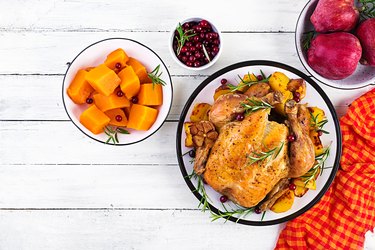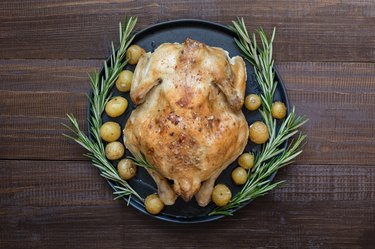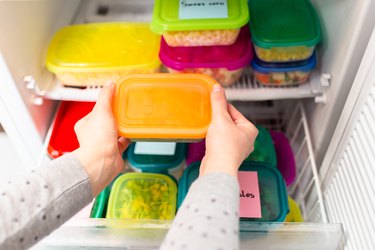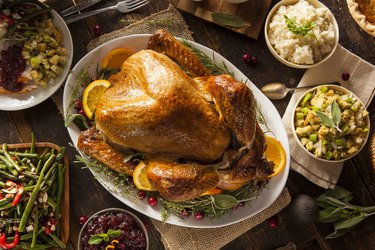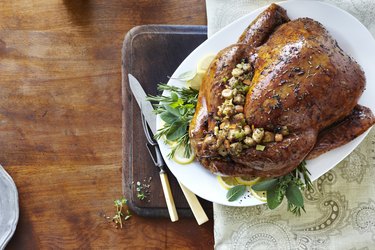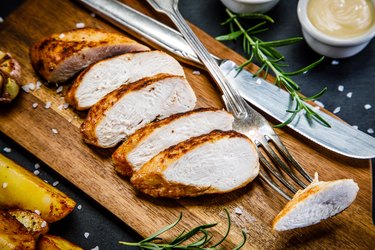
Something you can be confident of: When prepared properly, turkey is moist and tender straight out of the oven.
But when it comes time to reheat turkey, you might have a handful of questions: What's the best way to reheat leftover turkey — breast, legs and all — without drying it out? How do you keep roast turkey moist? Should the turkey be covered or uncovered? How many times can you reheat turkey? Perfecting your leftovers can be a bit overwhelming.
Video of the Day
Video of the Day
The good news: After safe storage — with stuffing removed and the turkey stashed in the refrigerator within 2 hours of cooking — leftover turkey can be served cold. Eating it cold means you won't have to worry about the turkey drying out during the reheating process.
But if you're craving a reprise of your hot turkey meal, the reheated meat doesn't have to taste rubbery. In fact, storing cooked turkey overnight and reheating it the next day can make it just as yummy and juicy as the freshly roasted bird straight from the oven — as long as you follow a few tips.
To prevent foodborne illness, use a food thermometer to make sure your turkey has reached an internal temperature of 165 degrees Fahrenheit before serving, according to the University of Illinois Extension.
Find out more about how to keep turkey moist during the reheating process below.
How Many Times Can You Reheat Turkey?
Ideally, you want to eat refrigerated leftovers as soon as possible — within two to three days, per Windsor-Essex Health Unit. You should avoid reheating leftovers more than once. To mitigate food waste, try reheating smaller portions at a time. You can always reheat more turkey, but you can't undo the reheating.
How to Reheat Turkey in an Oven
Things You'll Need
knife
shallow pan
broth of choice (or water)
aluminum foil
food thermometer
1. Preheat the Oven
Reheating turkey in the oven is pretty simple. Start by preheating the oven to 325 to 450 degrees Fahrenheit. Using a lower temperature will warm up the meat too slowly and may allow bacteria to survive, according to the USDA.
2. Carve the Pieces
If the turkey was refrigerated whole, or you're working with a precooked turkey for Thanksgiving or another event, slice it into smaller pieces to allow for quick and even reheating. Legs and wings may be left intact, but breast and thigh meat can be carved into slices.
3. Prep the Turkey
Place the pieces of turkey in a shallow pan — a rimmed cake or casserole pan is ideal.
If possible, avoid layering meat and try to place pieces so they don't overlap. If you're feeding a larger crowd, it may be necessary to use more than one pan.
4. Keep It Moist
Pour leftover turkey or chicken broth over the meat, creating a 1/2-inch bath of broth in the bottom of the pan.
You may substitute store-bought turkey, chicken or vegetable broth or stock. If you don't have any broth, just use water. Cover the pan tightly with aluminum foil.
5. Cook the Turkey
Reheat the turkey until a meat thermometer inserted into the center of each piece reaches at least 165 F.
Avoid touching the bone with the thermometer, as it may register higher than the meat's actual temperature.
How to Reheat Turkey on the Stovetop
Things You'll Need
shallow skillet with lid
broth of choice (or water)
aluminum foil (optional)
food thermometer
1. Use a Shallow Skillet
Place carved turkey pieces in a shallow skillet. If you want to reheat bone-in meat and boneless breast meat, separate the bone-in and boneless pieces into separate skillets.
2. Maintain the Moisture
Pour broth or water over the turkey pieces until the turkey is in a bath of about 1/2 inch of liquid. Turn the stove burners to medium to high heat.
3. Warm the Turkey
Cover the pan tightly with a lid and heat the turkey until it's warmed through. If the pan doesn't have a lid, cover it tightly with aluminum foil instead.
Test the meat by inserting a food thermometer, making sure the internal temperature of the thickest portion of turkey is at least 165 F.
How to Reheat Turkey in the Microwave
Things You'll Need
microwave-safe dishes
broth of choice (or water)
microwave-safe plastic wrap (optional)
1. Prep the Pieces
Separate bone-in and boneless pieces into separate glass or microwave-safe dishes.
2. Add the Liquid
Pour broth or water over the turkey pieces until the meat is resting in about 1/2 inch of liquid.
Cover the dish with a microwave-safe lid or plastic wrap, but don't let the plastic wrap touch the meat. Do not cut a slit in the plastic wrap.
3. Heat the Turkey
Reheat the turkey, turning the dish every 2 minutes if the microwave doesn't have a turntable. The turkey is ready to eat when it reaches an internal temperature of 165 F on a meat thermometer.
Your microwave's manual should provide directions for the appropriate power level for reheating poultry based on the wattage of your microwave.
What About the Air Fryer?
You might reheat turkey in the air fryer using similar techniques as stovetop reheating, depending on the type of air fryer you have. Be sure to check the manufacturer's instruction manual to reheat your turkey properly.
According to Consumer Reports, key to cooking with an air fryer is not overfilling the basket. Because air fryers tend to have smaller capacities than conventional ovens, this might be a better place to try reheating turkey slices or smaller pieces.
- USDA: "Let's Talk Turkey - A Consumer Guide to Safely Roasting a Turkey"
- University of Illinois Extension: "The Perfect Turkey Meal"
- Consumer Reports: "How to Get the Most From Your Air Fryer"
- Windsor-Essex Health Unit: "Safe Turkey Preparation and Handling"
- University of Florida Extension: Holiday Cooking; Turkey Food Safety
- University of Wyoming Cooperative Extension Service: Turkey Talk; Darlene Christensen, Debbie Popp, Bonnie Ellenwood and Jane Wolery
- Cook's Illustrated: Reheating Leftover Turkey
